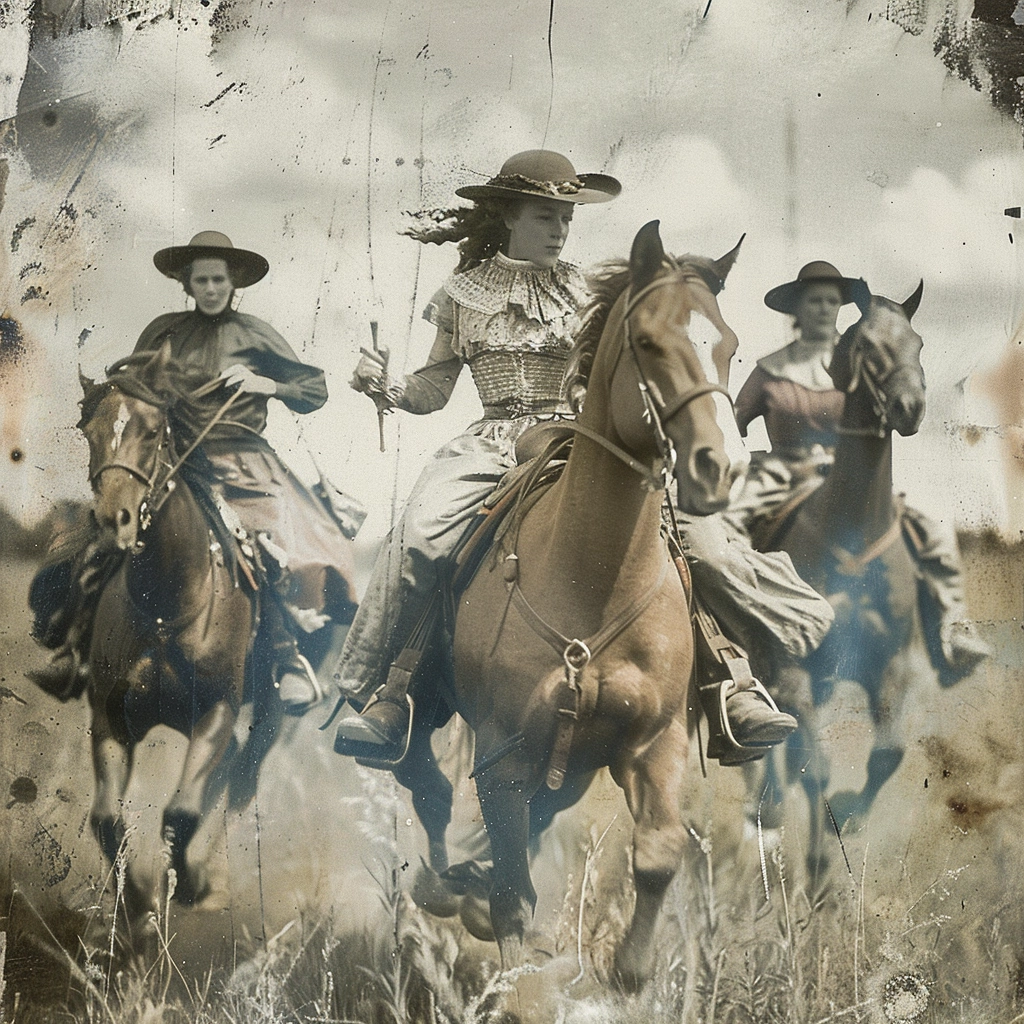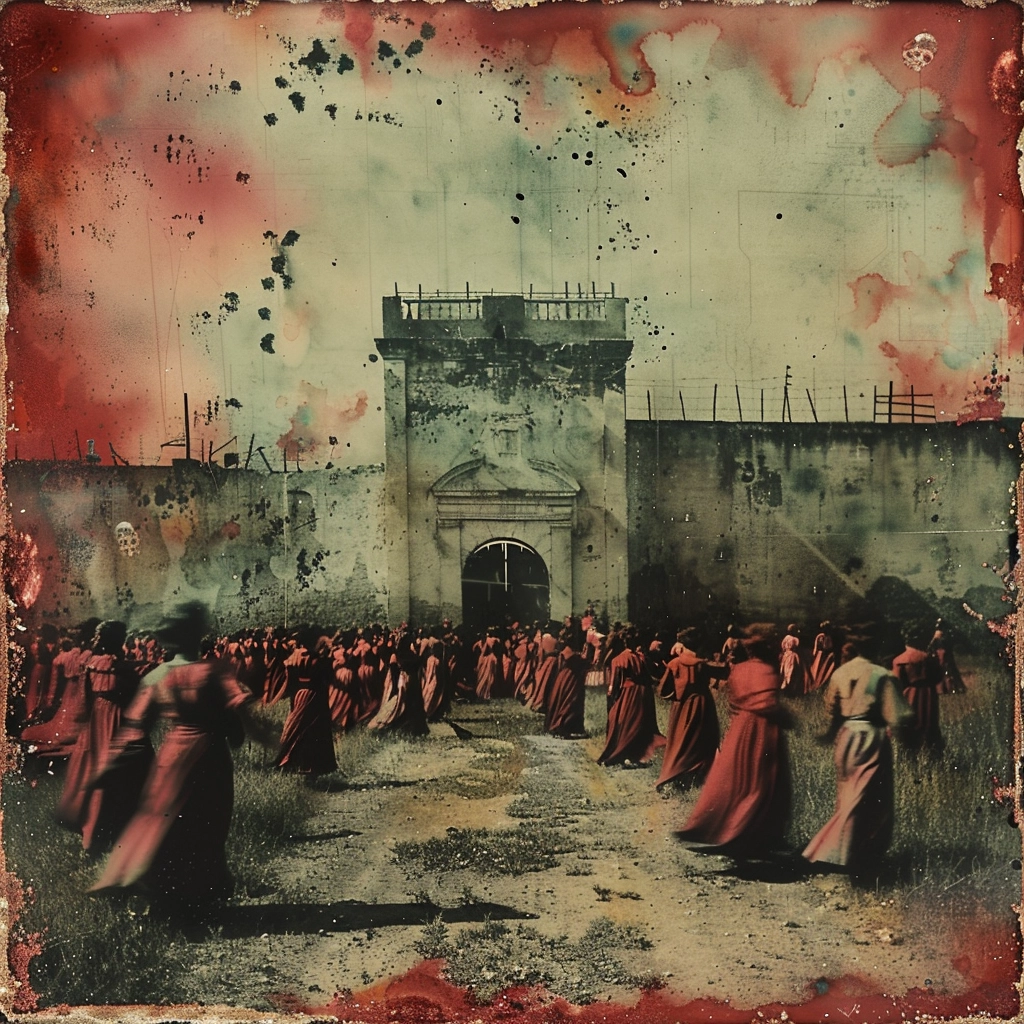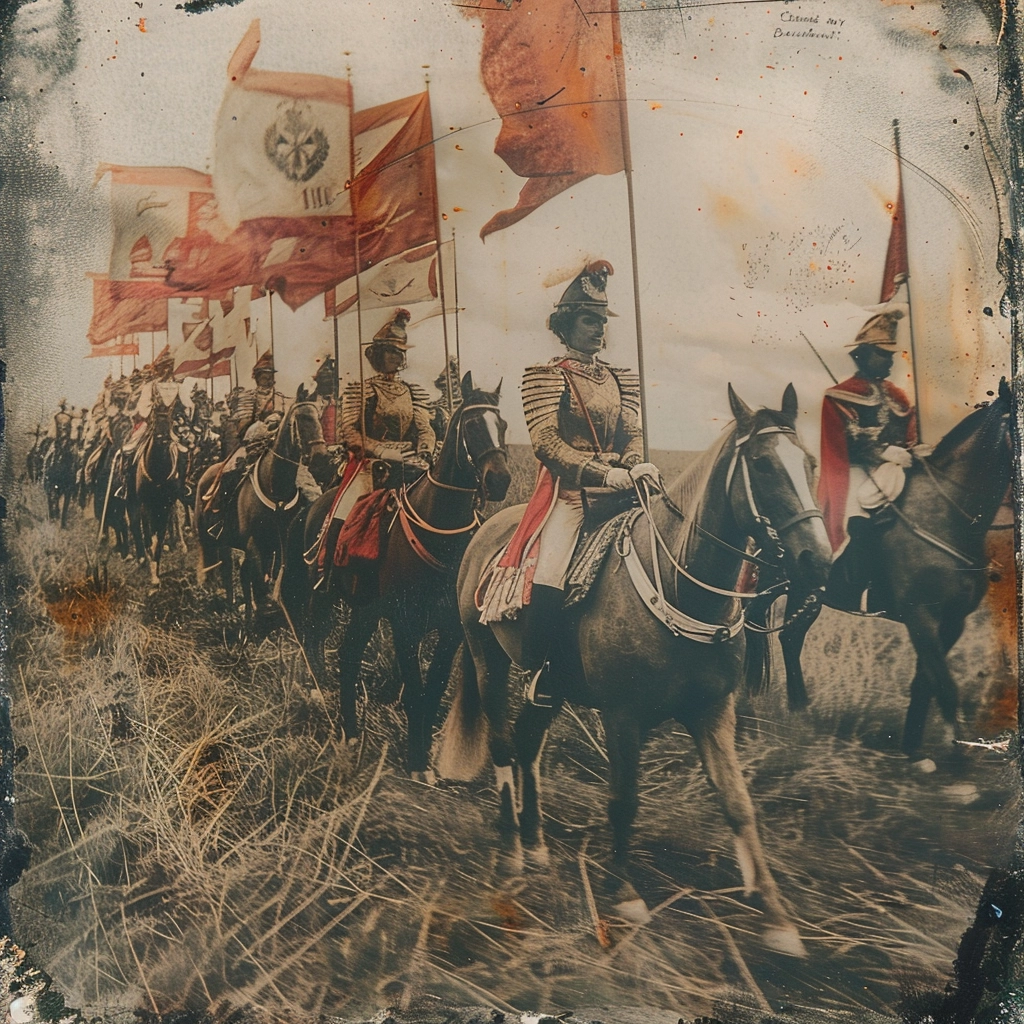BEATRICE THE SIXTEENTH (11)
By:
June 21, 2024

Beatrice the Sixteenth: Being the Personal Narrative of Mary Hatherley, M.B., Explorer and Geographer (1909), by the English feminist, pacifist, and non-binary or transgender lawyer and writer Irene Clyde (born Thomas Baty) introduces us to Armeria, an ambiguous utopia — to which we are introduced initially without any firm indications of its inhabitants’ genders. HiLoBooks is pleased to serialize this ground-breaking novel for HILOBROW’s readers.
BEATRICE THE SIXTEENTH: 1 | 2 | 3 | 4 | 5 | 6 | 7 | 8 | 9 | 10 | 11 | 12 | 13.
THE RAMPARTS
In the evening Ilex entertained the officers and two or three acquaintances who were among the companies garrisoning the fort. It was a quiet affair; most of those present realised the gloomy prospect before them — if it is a gloomy fate to be selected to perish in defence of a country one is proud of. At all events, the outlook, if not depressing, was a serious one. And only one or two of the party showed much hilarity in the face of it. I do not reckon the forced spirits of those of us who were very young.

The visitors dropped off early to their unfamiliar quarters. It was past midnight when we were awakened by a rush of spearmen to the gate and a wild knocking with the bosses of swords. I gained the parapet of the flat roof, and saw the sparkle of a beacon fire blazing at the head of the pass. At the same a instant a roaring flame shot up from the little square tower not far from where I was. It was easy, now, to see the gate opened, and the eager scouts admitted. Hardly five minutes had passed when a form, a running with frantic speed, came into the zone of light, making for the gate. Pursuing were three horsemen, whose javelins twice missed her. I saw one of them reel from her saddle and another rapidly turn her bridle and rush away. The third closed on the fugitive, who was forced to turn and defend herself. A party of our soldiers started to relieve her; but she stumbled forward and fell — when her antagonist galloped back. I saw her dragged in, and I went down to the gate to see if I could be of any assistance. All confusion was over now. The troops were standing in rank, motionless and composed. I could not make out where the wounded soldier had been carried. Ilex was found. So I crept up to the roof again, and peered over the edge, vainly trying to pierce the darkness that lay beyond the region illuminated by the fire.
“She had hard work to make the beacon burn,” I heard a voice say from below. “Some of the sticks had been damp.”
“Ah!” returned another voice.
“I don’t envy whoever left the damp sticks there, Flora!”
“What would happen to them?”
“Happen?” growled the other.
I lost her next few words. “It’s cost Quôna’s life already.”
“Is she gone?”
“Don’t ask me! How do I know? But I say — can she live? The state she was in when we pulled her through the gate?”
“Well,” said Flora, after a moment, “it’s only a bit sooner than the rest of us!”
I heard no more. It was an hour or two before Ilex came and joined me on the parapet. Together we strained our eyes to the darkness; we could see nothing-nothing a light. But we knew that where we looking, the van of the enemy’s army must be stealthily streaming past. It was an eerie feeling. Before day broke Ilex insisted on my going downstairs to sleep.
In the morning it was plain to be seen that we were regularly invested. I stood with the little groups of officers by the lower tower, and watched the long lines of horse and foot pass by at a respectful distance, near the foot of the hills. Nearer to us, a strong body of spearmen were stationed, and as we looked, a javelin came whistling past us.
Phartis, who is young and new to campaigning, jumped. The rest of us looked at each other and raised our eyebrows.
“It is no use firing back at them,” observed Ilex. “That dart wasn’t a very good shot; still, we needn’t give them such a promising target. Tell the troops not to show themselves, Phynax.”
We accordingly lay low. The enemy did not attempt an assault, but contended themselves with keeping us isolated. An odd feeling it was — that all those moving living creatures, flesh and blood like ourselves, were bent on our destruction. It seems so natural to save life; yet there they were — palpable, audible, and determined to take it. What quarrel had we with them?

And so now we realised that we were cut off from Pyramôna by miles of country swarming with the Uras people. Like the tide of the sea, the flood of invasion had welled past us, and left us — for how long? — On our pinnacle of rock. Through the day, as we did not molest them, the besiegers became encouraged to approach the walls. Their discipline was not very good. They thronged round the fort in masses on every side, and indulged in provocative language to their hearts’ content. I did not understand much of it, but the accompanying gestures were significant enough. At evening they quietened, and their aspect was a good deal more calculated to inspire alarm, as one noted their silent, ferocious glances. It was then that we had a note from the commander — Arainol — declaring the intention of carrying the fort by assault if it was not surrendered within twelve hours.
“She gives us lots of time. Let them try!” observed Ilex dryly; and she led me to the station at the inner edge of the roof, where one had a good view without being a conspicuous mark for spear-practice. All round, the clustered ranks of the enemy glared upon us. Above, the sun was sinking. A great slanting cloud, leaden itself, but shot with metallic rose, lay over the horizon; two or three bars of the same pearly rose-lustre stretched beneath it, in the yellow-green light of the ebbing day. We were alone with the silent crowd outside, and the silent earth and heavens encompassing them.
I looked at Ilex and she was smiling. I moved backwards, and laid my head on her shoulder. She clasped me close in her arms. My thoughts flew back to the first time when I had quivered at her touch.
“Oh, my sweet!” she said, speaking with tense utterance as her heart beat near mine. “In the whole gamut of human emotion, is there any such thrill as that of knowing that one has someone one loves close — close — to one? Wilder, there may be, but anything so satisfying and perfect — no!”
I trembled with delight in her arms. A sparrow, flying home, fluttered past our faces, and recalled to us the fact that it was growing dark. We turned to go to the rooms below, and as we did we met one of the staff.
“I was coming for you, Ilex,” she said. “I don’t think the girl that lit the beacon can last much longer. But I’m sorry if I disturbed you! You were a enjoying a few quiet moments, eh?”
Ilex kept hold of my arm.
“I’m coming Kothrûn, she might be conscious. And there is a good deal else to do.”
We passed down the steps, and Ilex would have left me at my chamber.
“It’s not a sight for you,” she declared. “Her face and neck poor thing! She is awfully disfigured.”
“My dear, I have not been in hospital for nothing,” I replied. “I ought to be used to that! Perhaps you might let me help a bit.”
But I saw in a moment that it was not a case for help, when she let me go into the room where the wounded girl lay.
The next day was a trying one. Momentarily expecting an assault, we went about such duties as we could find, in a half-hearted kind of manner. We did not doubt that we could repel an attack; but there is always an uneasy feeling that the sentries may be lax or deceived by some stratagem. The presence of an active and determined besieger does not add to the comfort of a garrison, though it may to its entertainment.
And in the evening our spirits received a further depressing shock. Throughout the hostile camp there were signs of jubilation and delight. Groups of grotesque warriors danced wild flings of hilarious joy; spears came whizzing innocuously into the fort (where they were assiduously collected and impounded). Loud shots of triumph reached, hoarse or shrill, across our walls, their sound swelling and falling on the breeze.
“Queen Beatrice taken!”
“Marshal Otâris smashed to shivers!”
Asked Phratis: “What are they saying?”
“Listen and you’ll hear,” responded Kothrûn grimly, flicking the dust off a stone with her sleeve.
“Ten thousand! Ten thousand prisoners!” roared a voice.
“That’s not true,” remarked Phynax calmly.
“The way open to Alzôna!”
“The Armerian beasts running like sheep!”
“Slaves for us! — Plenty of slaves for us! I’ll have three senators for mine — the three richest!”
“Cheers for Marshal Klên! Shout for the Marshal! Shout for ourselves!”
“Well,” remarked one of the staff dryly, “if all this is true ladies, we had better throw up the sponge at once.”
Nobody spoke, and we all glared at the unfortunate humorist, who escaped under cover of a forced laugh.
“What do you suppose it really means, Ilex?” said Phratis.
“Maybe they’ve gained a small success,” said she, “maybe a big one. Or it may be just a camp report. It’s dull work sitting here, and people are glad of an excuse to excite themselves. I dare say it is nothing, after all, but that. Whatever it is, it makes no difference to us.”
Perhaps it should not have, but truth compels me to add that it did.

“Where are those prisoners?” inquired Phynax the next morning, as we sat and peeped between the battlements. “It strikes me, I don’t see them.”
“They went past in the night, obviously,” said Phratis. “Or else they are scaling the perpendicular heights. Or perhaps they are all massacred.”
“Of course, the real reason you don’t see them is this,” urged another, “they daren’t bring them past here, for fear we should rescue them.”
In spite of this attempt at badinage, we were dull enough. The days wore on, and there was no sign of any check to Uras forces. At last one grew so weary of the monotony of waiting, and the unexplained passage of the days without incident grew so maddening, that we would most of us almost have welcomed clear signs of defeat. But still no change took place in the outlook. The enthusiasm of the besiegers was not repeated. Yet there was no indication of their retreating.
But at night, wild sounds wakened the echoes of the hillsides. Voices, mingled with the clash of steel, the patter of shod feet, the canter of horses — all roused our small garrison to instant activity. Round the fort surged an eddy of feverish movement. But it was impossible to do anything. One of the soldiers offered to be let down over the wall, with a view to getting information, but it was too great a risk.
Before daylight there came a rush of horse, and a tremendous knocking at the gate. The party assured us they were friends, but we did not venture to admit them, though Kothrûn said she was sure she recognised a voice or two she knew.
But when the day broke, we saw from our station on the walls the pass dotted with troops indeed, but unmistakably our own. We burst into a hearty shout of delight, and lost no time in opening the gate to a small party of mounted troops who were demanding an entrance.
Ilex bent her proud head low, before their leader. And then I saw that her helmet was encircled by a golden crown; and all at once, I knew it was the queen.
Her majesty was in excellent spirits.
“I shall not have laurel-wreaths enough!” she declared. “However, here is one for you, Ilex — and give each of your troops a leaf out of this other. In return, I would like some breakfast with hot coffee.”
It was not like her to be so jocular, and I guessed that she had been affected more than she cared to show by the events of the past few days. It was not long before we learnt the history of them. The contact between the opposing armies had taken place later than was expected. The manœuvres had been more complicated. But, in its essence, the plan of drawing the enemy though the neglected pass, and falling on them by a telescopic concentration had succeeded, though the losses had been serious.
“It had nearly failed, though,” said Beatrice. “Information was sent to Oristhôn by (who do you think it was? — The Second Secretary to the Treasury) which would have warned them at once; if they had believed it!”
The queen took a long drink of coffee.
“But,” she went on, laughing, “of course, they didn’t believe them! The stupid creatures! And it was really almost a miracle — the wrong ring went. The messenger got hold of the wrong ring, somehow; so they sent one of their people to make inquiries, and clear up matters. She was taken; and so it all came out.”
“And I think,” I said, “that I can explain to your majesty the miracle of the rings.”
So I told her the story of our adventure in the hut. She was in a temper to enjoy the small comedy, and was frankly amused. Glancing up, I caught sight of Nîa, who was serving the table. Her face was set and white; the lips tightly closed.
“Is she not well disposed to the queen?” I thought. “It can’t be that she resents my talking about the affair!” Or did she?
It was not until evening, when all was quiet, and the royal party, taking Ilex with them had gone forward to direct the pursuit, that she came to me, still white and trembling, and laid herself on the ground beside me, with her head on my knee.
“What’s the matter?” I said, stroking her black, rough hair. “My dear Nîa, you are SO easily upset! Pull yourself together!”
“Zôcris!” she murmured — “Zôcris! What can have become of her? No one knows — I have asked everybody who would speak to me. And that girl, Nalmyon, at Oristhôn — oh, I don’t care if she is a grandee and a Colonel! — She is the cruelest brute! My lady, — she is in her hands, and when she gave her the wrong ring, and she find out —”
She stopped speaking and her breath came in long, choking gulps, while hot tears dropped on my dress. None of the Armerians had ever cried that I had seen, and Nîa’s distress unnerved me not a little.
“Why, Nîa, she won’t find out,” I said. “They will think the Secretary sent the wrong ring. No doubt she is rogue enough to have plenty of forged signets.”
“Oh, you don’t know them!” she moaned hoarsely. “If she had nothing whatever to do with the mistake, still, she was mixed up in it, and in their power — and a slave!”
“She’s clever, Nîa — she’ll manage to outwit them!”
But this well-intentioned remark had the effect of making Nîa breakdown completely.
“I have got her killed — or worse!” were the only coherent words I could gather.

It was all very far from enlivening; but it kept me from worrying about Ilex, who returned early in the morning with the gratifying intelligence that the enemy was entirely dispersed, and all real danger was over.
“Only,” she said, “there are a good many of them supposed to be hiding in the hill-caves, and they will want rooting out. After I have had a sleep, I will try and begin the work.”
“And I must go with you?”
“No, Mêrê, I don’t want to take you into a bear’s den, do I?”
“And you don’t want to go into a bear’s den yourself. If this kind of bear is good for you to hunt, it’s good for me.”
“Well, please yourself! I won’t be sorry to have you, for I’ve no surgeon to take with me. I must leave the regimental doctor here; there are some wounded coming in. Only mind — bears have claws!”
Most of the soldiers who had been disabled during the Pursuit had been taken to Pyramôna. But search parties had brought in a few from the hillsides and now a dismal little procession entered at the gate.
“Two civilians dead; three of the Dragon regiment wounded slightly,” reported somebody.
“Two civilians?” I heard Ilex say. “Of all the cool pieces of brutality —” And her voice suddenly fell. She spoke to the officer for a minute, gave a hurried direction, and came away.
“Dear, do you know who it was?” she said, her eyes meeting mine, “Phanaras!”
“What! The lady of luxury and affection? The exquisite who never set her foot on the ground? How could she come this way? Ah! I see, Ilex: everybody thought this a safe corner till four days ago.”
“Yes, I suppose so. Yet she and her companion were apparently wandering about alone, on the hills. Those three soldiers came up when the people who had killed them were plundering them, and they themselves were knocked about, rather. I must say it’s unaccountable to me.”
I could say nothing. Yet I felt clear in my own mind that somehow, in a wild rush for personal safety, Phanaras had fallen into the fate she had met. Perhaps she had chosen a pleasant refuge among the hills, and, alarmed at the near approach of the enemy, a she fled blindly, like a moth, into their arms. I tried to feel sorry for her.
With that dull little group, which Ilex would not let me go near, in my sight, it was not difficult to succeed. So fond of flattery and ease! And she had been cut down by a soldier’s broadsword, alone, nearly, on these bleak rocks. Yet, if it had been Opanthë lying there — inconsistent as we are — I should have been more sorry.
Ilex was dull and absorbed as we rode away through the pass.
RADIUM AGE PROTO-SF: “Radium Age” is Josh Glenn’s name for the nascent sf genre’s c. 1900–1935 era, a period which saw the discovery of radioactivity, i.e., the revelation that matter itself is constantly in movement — a fitting metaphor for the first decades of the 20th century, during which old scientific, religious, political, and social certainties were shattered. More info here.
SERIALIZED BY HILOBOOKS: Jack London’s The Scarlet Plague | Rudyard Kipling’s With the Night Mail (and “As Easy as A.B.C.”) | Arthur Conan Doyle’s The Poison Belt | H. Rider Haggard’s When the World Shook | Edward Shanks’ The People of the Ruins | William Hope Hodgson’s The Night Land | J.D. Beresford’s Goslings | E.V. Odle’s The Clockwork Man | Cicely Hamilton’s Theodore Savage | Muriel Jaeger’s The Man With Six Senses | & many others.
